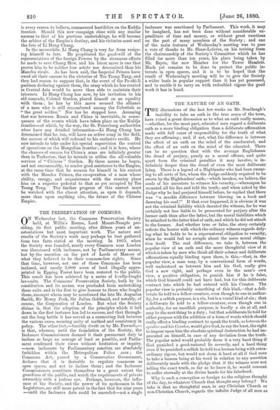THE PRESERVATION OF COMMONS.
ON Wednesday last, the Commons Preservation Society held, at Willis's Rooms, Lord Mount-Temple pre- siding, its first public meeting, after fifteen years of un- ostentatious but most important work. The nature and results of the Society's work may perhaps be best gathered from two facts stated at the meeting. In 1865, when the Society was founded, nearly every Common near London was threatened with inclosure, not by Parliamentary means, but by the assertion on the part of Lords of Manors of what they believed to be their common-law rights. Since that time, however, not one of these Commons has been inclosed, and nearly 3,000 acres of land illegally appro- priated in Epping Forest have been restored to the public. This result has been achieved by a series of hardly-fought law-3uits. The Commons' Preservation Society, both by its constitution and its means, was precluded from undertaking these suits, and is the first to give honour to those who fought them, amongst whom may be mentioned the late Mr. Augustus Smith, Sir Henry Peek, Sir Julian Goldsmid, and notably, of course, the Corporation of London. But what the Society claims is, that the adoption of the principles which it laid down in the first instance has led to success, and that through- out the long battle it has served as a connecting link between the various cases, securing unity of method and consistency in policy. The other fact,—forcibly dwelt on by Mr. Fawcett,— is that, whereas, until the foundation of the Society, the Inclosure Commissioners deemed it their paramount duty to inclose as large an acreage of land as possible, and Parlia- ment confirmed their views without hesitation or inquiry,
inclosures by Parliamentary sanction are absolutely forbidden within the Metropolitan Police area ; the Commons Act, passed by a Conservative Government, declares that it is desirable to regulate commons as open spaces, and not to inclose them ; and the Inclosure Commissioners constitute themselves to a great extent the guardians of the public, and watch the requirements of private ownership with a jealous eye. Perhaps, however, the influ- ence of the Society, and the power of its spokesmen in the Legislature, are still more patent in the fact that for nine years —until the Inclosure Acts could be amended—not a single inclosure was sanctioned by Parliament. This work, it may be imagined, has not been done without considerable ex- penditure of time and money, or without great exertions on the part of many members of the Society ; and one of the main features of Wednesday's meeting was to pass a vote of thanks to Mr. Shaw-Lefevre, on his retiring from the chairmanship of the Society's Committee which he has filled for more than ten years, his place being taken by Mr. Bryce, the new Member for the Tower Hamlets. Much yet remains to be done to protect the public in- terests in open spaces, and it is to be hoped that the result of Wednesday's meeting will be to give the Society a wider basis in popular support than it has yet possessed, and to enable it to carry on with redoubled vigour the good work it has in hand.


































 Previous page
Previous page